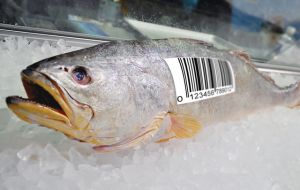MercoPress. South Atlantic News Agency
Reducing fisheries wastage, harmful practices and improving traceability
 Food chain traceability is increasingly a requirement in major fish markets
Food chain traceability is increasingly a requirement in major fish markets An estimated 1.3 billion tons of food are lost per year, which is up to about one-third of all food produced. This figure includes post-harvest fish losses, which tend to be greater in small-scale fisheries, according to the latest edition of FAO’s The State of World Fisheries and Aquaculture.
In small-scale fisheries, quality losses are often far more significant than physical losses. Improved handling, processing and value-addition methods could address the technical aspects of this issue, but it is also vital to extend good practices, build partnerships, raise awareness, and develop capacity and relevant policies and strategies.
The report also notes that illegal, unreported and unregulated (IUU) fishing remains a major threat to marine ecosystems and also impacts negatively on livelihoods, local economies and food supplies.
Food chain traceability is increasingly a requirement in major fish markets, especially in the wake of recent scandals involving the mislabeling of food products. FAO provides technical guidelines on certification and eco-labeling which can help producers demonstrate that fish has been caught legally from a sustainably managed fishery or produced in properly run aquaculture facility.
In particular, the report stresses the importance of the Code of Conduct for Responsible Fisheries which, since its adoption almost two decades ago, remains key to achieving sustainable fisheries and aquaculture. The Code promotes the responsible use of aquatic resources and habitat conservation to help boost the sector’s contribution to food security, poverty alleviation and human well-being.
FAO is also promoting “Blue Growth” as a framework for ensuring sustainable and socioeconomically-sensitive management of oceans and wetlands.
At the Global Oceans Action Summit on Food Security and Blue Growth held in The Hague, Netherlands, governments and other participants committed to actions focused on tackling climate change, overfishing, habitat loss and pollution in a bid to restore productive, resilient oceans. (FAO).-




Top Comments
Disclaimer & comment rules-

-

-

Read all commentsA great leap forward in tackling this problem could be made by closing down ALL the argie fishing fleets.
May 24th, 2014 - 10:12 pm 0You KNOW it makes sense!
Or just eat more insects?
May 25th, 2014 - 06:55 am 0An equally great leap forward could be made by reducing the size of spanish fishing fleets. In recent years, the UK fishing fleet has numbered 7,662 to serve a population of over 63 million. By comparison, spain has 17,500 vessels for a population of less than 47 million. Spain should be forced to reduce to around 3,900 vessels. And stop illegally raking the seabed in Gibraltar waters as well.
May 25th, 2014 - 02:01 pm 0Commenting for this story is now closed.
If you have a Facebook account, become a fan and comment on our Facebook Page!